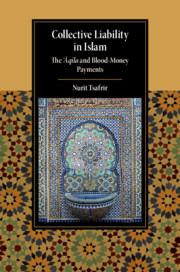Book contents
- Collective Liability in Islam
- Cambridge Studies in Islamic Civilization
- Collective Liability in Islam
- Copyright page
- Dedication
- Contents
- Preface
- Acknowledgments
- Part I The Contribution of Islamic Values
- Part II The Contribution of the State Administration
- Part III The Contribution of the Persians
- 7 The Eastern Iranian Ḥanafī Views on the ‘Āqila: A Presentation
- 8 The Eastern Iranian Ḥanafī Views: The General Context
- 9 The Eastern Iranian Ḥanafī Views on the ‘Āqila: An Examination
- Conclusion
- Bibliography
- Index
- Other titles in the series:
7 - The Eastern Iranian Ḥanafī Views on the ‘Āqila: A Presentation
from Part III - The Contribution of the Persians
Published online by Cambridge University Press: 19 December 2019
- Collective Liability in Islam
- Cambridge Studies in Islamic Civilization
- Collective Liability in Islam
- Copyright page
- Dedication
- Contents
- Preface
- Acknowledgments
- Part I The Contribution of Islamic Values
- Part II The Contribution of the State Administration
- Part III The Contribution of the Persians
- 7 The Eastern Iranian Ḥanafī Views on the ‘Āqila: A Presentation
- 8 The Eastern Iranian Ḥanafī Views: The General Context
- 9 The Eastern Iranian Ḥanafī Views on the ‘Āqila: An Examination
- Conclusion
- Bibliography
- Index
- Other titles in the series:
Summary
This chapter shows how the Persian Ḥanafīs in Khurasan and Transoxania in the ninth and tenth centuries AD developed their own opinions about the composition of the ‘āqila, questioning the hegemony of the standard Ḥanafī law, which developed in Iraq. Three unique Persian opinions, which seem to reflect the reality of life in eastern Iran, are presented. The first one extends the ‘āqila beyond the military dīwān, claiming that the dīwān whose members serve as an ‘āqila may also be a civilian institution, whose members receive regular remuneration. According to the second opinion, the ‘āqila of those who do not receive a salary from the government is not necessarily their tribesmen, as ruled the Iraqī Ḥanafīs, but can be any solidarity group, such as the residents of the same quarter, or men of the same occupation. The third opinion rejects the ‘āqila, contending that this institution does not exist among Persian Muslims, because the structure of their society does not allow for solidarity groups.
- Type
- Chapter
- Information
- Collective Liability in IslamThe ‘Aqila and Blood Money Payments, pp. 87 - 94Publisher: Cambridge University PressPrint publication year: 2020

